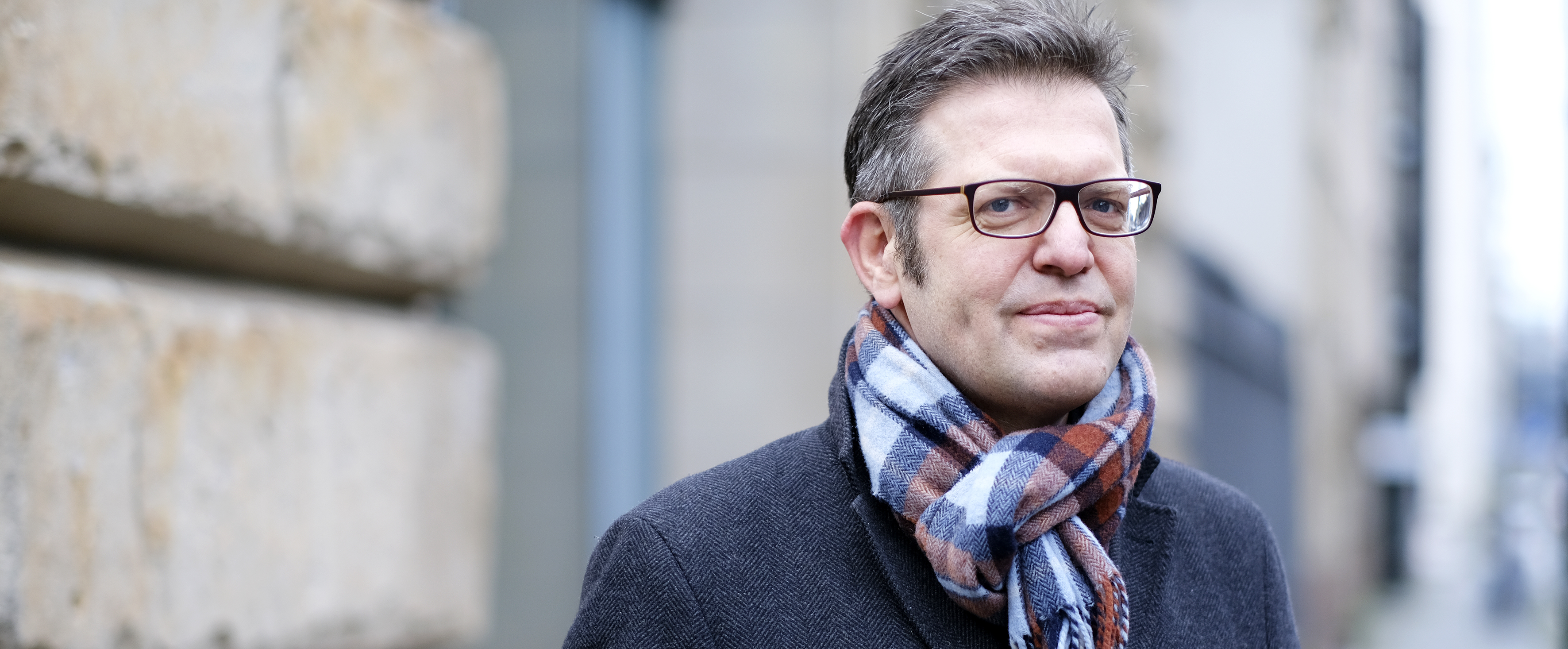2023 Communicator Award Goes to Steffen Mau
Berlin sociologist receives award for bold communication approach and impressive variety of formats / Award ceremony at the DFG annual meeting in Saarbrücken on 26 June
Steffen Mau
© Matthias Heyde
This year, the Communicator Award presented by the Deutsche Forschungsgemeinschaft (DFG, German Research Foundation) and Stifterverband goes to the Berlin-based sociologist Steffen Mau, whose research explores key areas of social science in a new way. His themes include social inequality and injustice, structural change among the middle classes and new border regimes. His insights on these topics are also the focus of his communication: Mau receives the prize of €50,000 for his bold and multifaceted approach to communication, by which he succeeds in introducing expertise and orientational knowledge about transformation processes into public debate, enabling his audience to be able to identify with what he is saying based on their own experience and perspectives.
In its decision, the Communicator Award jury praised Mau for attempting to bring objectivity to heated public discourse through an impressive variety of formats – ranging from numerous small-scale events and social media posts to science slams and non-fiction books which make it onto the bestseller lists. In doing so, said the jury, he avoids putting forward reckless hypotheses or attempting to grab the limelight, but instead is particularly successful in engaging in direct dialogue with people in ways that cannot always be planned or predicted.
Made up of science journalists, communication professionals and PR experts and chaired by DFG Vice President Professor Dr. Julika Griem, the jury highlighted the fact that Mau’s communication approach seeks out blind spots on the map of science communication and initiates dialogue on a low-threshold basis in places where it has not tended to happen very frequently in the past. He also talks to the people who are the subject of his research: his successful non-fiction book Lütten Klein was not the end product of research into origins but rather the prelude to new interactions. At more than 40 individual events in eastern Germany alone, he fielded questions from a largely non-academic audience, where – as Mau himself described it – people had an enormous “desire to get things off their chest”.
Mau is also committed to political education and the promotion of democracy. He speaks at non-university educational events, at foundations, at the Federal Agency for Civic Education (bpb), at schools, and in connection with civil society initiatives. His sociological non-fiction books and essays are made available to a wide audience as part of the bpb’s publication series. Cultural institutions such as museums are also important venues for his communication activities: here, as Mau himself says, “it is possible to draw on different types of contextualisation and points of reference”. To some extent, his sociological studies have themselves served as inspiration for certain exhibition concepts, and he has also been directly involved in the development of such concepts.
In addition, Mau makes use of theatrical performances, appearances at literary festivals and direct interviews with literary figures to open up new communicative spaces and do more to strengthen the links between research and culture. For example, he discussed his book Sortiermaschinen. Die Neuerfindung der Grenze im 21. Jahrhundet (“Sorting machines. The reinvention of the border in the 21st century”) with the writer Nora Bossong at the Berlin International Literature Festival. Meanwhile the play Abbau Ost (ACUD Theatre Berlin) used a text fragment by Mau, among other things, to critically question clichéd images of reunification as a narrative of success or sacrifice.
Steffen Mau has been Professor of Macrosociology at Humboldt-Universität Berlin since 2015. Born in Rostock, he initially trained as an electronics technician at the state-owned marine electronics company VEB Schiffselektronik Rostock before going on to study sociology and political science at the Freie Universität Berlin after reunification. He obtained his doctorate at the European University Institute in Florence in 2001 and was Professor of Political Sociology at the University of Bremen from 2005 to 2015. He has held visiting professorships and fellowships in such places as Sciences Po in Paris and Harvard. From 2012 to 2018 he was a member of the Scientific Commission of the German Science and Humanities Council (Wissenschaftsrat, WR), and from 2019 to 2021 he was also co-spokesperson of the Cluster of Excellence “Contestations of the Liberal Script”. His research has already received numerous awards, most notably the DFG’s Gottfried Wilhelm Leibniz Prize in 2021.
The Communicator Award – Science Award of the Stifterverband has been awarded every year since 2000 and is regarded as Germany’s most important prize of its kind. The award goes to researchers who are particularly creative in their science communication, taking new, courageous paths and addressing their target groups in suitable and effective ways. They must also recognise the societal dimension of their research and contribute their knowledge to public debate, opinion-forming and decision-making processes. The prize money supports the recipient’s public engagement activities and enables them to implement new projects.
The jury selected Steffen Mau by means of a multi-stage selection process out of 39 applications and nominations. The Communicator Award will be presented by DFG President Professor Dr. Katja Becker and former Stifterverband President and Honorary Member Professor Dr. Dr. Andreas Barner at the DFG annual meeting on Monday, 26 June 2023.
